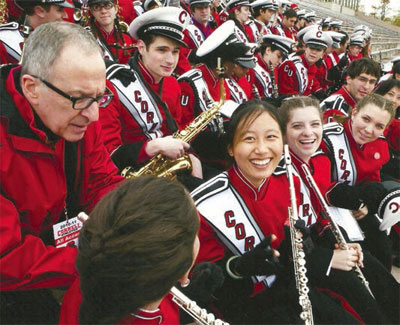From our beginning, Cornell has attracted students who are independent, adventuresome, hard-working, talented, and oriented to serve. More than 1,600 alumni have volunteered with the Peace Corps since its early years, and last year we ranked fifth among institutions our size in the number of Corps volunteers. For the past seven years, we’ve also been among the top contributors of graduates to Teach For America. While the size and diversity of our student body have increased dramatically over time, academic rigor has been a constant throughout our history, and our students’ independence, spirit of adventure, intellectual prowess, and boundless energy have only increased.

Throughout the generations, faculty-student interaction has been important at Cornell. Many of the University’s first students, along with President A. D. White, faculty members, and their families, lived in Cascadilla Hall—which, as the late Cornell historian Morris Bishop 1914, PhD ’26, noted, enforced “an intimacy which the students appreciated more than did the faculty.” During the administration of President Emeritus Hunter Rawlings, we intensified opportunities for faculty and students to interact. Many professors now involve undergraduates in research projects. Others live in residence hall apartments or share meals and activities with students as faculty/house fellows. My wife, Professor Robin Davisson, and I have been fellows at Carl Becker House on West Campus for several years, and we’ve thoroughly enjoyed the time we’ve spent with students there.
The University’s direct influence on student life has waxed and waned over the years in tandem with changes in society. Early students endured a military-like schedule, with chores before breakfast and other aspects of their days closely controlled. By 1875, student protests convinced the trustees to relax the military model, but the arrival of substantial numbers of women students in the late nineteenth century brought curfews and other restrictions.
Alumni of my generation will remember efforts to gain more autonomy as students, and by the early Seventies, many universities, including Cornell, had largely abandoned in loco parentis in favor of “freedom with responsibility.” Today, within that framework, Cornell aspires to be a community whose members take responsibility for their own well-being and strive to be caring and inclusive of others. Our expanded counseling services, wellness activities, and educational programs on diversity, inclusion, sexual consent, and violence prevention are reflections of that priority. And of course, from the beginning students have found ways to build communities within the larger university through musical organizations, athletic teams, debate societies, and other groups, which now number over 1,000.
Greek life has always been among the opportunities available to Cornell students. President White was a fraternity man, and with his support, seven Greek organizations established themselves on campus during the University’s first year. Today about one in three undergraduates chooses to affiliate with a fraternity or sorority, and participation last year was at a ten-year high. Fraternity and sorority members are often campus leaders, and as alumni they continue to provide leadership and service, including on our Board of Trustees.
I am heartened that our Greek organizations, in partnership with staff and alumni, have demonstrated their commitment to a safe and enriching experience for their members by developing and implementing a variety of innovative measures in recent years, including restructured recruitment and new member orientation. These changes are designed to curb unacceptable behaviors that have drawn broad public scrutiny while working to preserve and enhance those aspects of Greek life that make it valuable to so many students and alumni.
Looking ahead, I predict that students will continue to form clubs, play sports, join fraternities and sororities, and forge the meaningful connections with their professors, staff members, and alumni that a residential university like Cornell uniquely is able to provide. They will find ways to apply what they are learning to the needs of the world, as our Engaged Cornell initiative moves forward, and become even more globally aware and involved than students of today. I hope they will continue to take care of themselves and look out for each other. I am certain that they will remain adventuresome, independent, talented, and energetic, and as alumni they will look back fondly to their days on the Hill and stay involved with their alma mater, as so many of our alumni have done—and still do—today.


